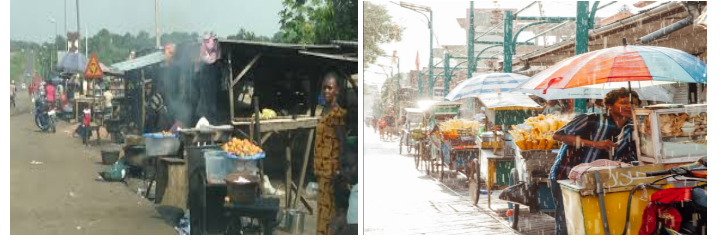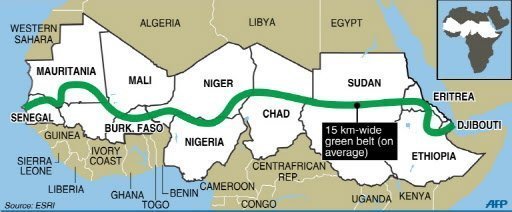
The quote, “Some people feel the rain, Others just get wet,” is attributed to the legendary Bob Marley, though some argue it to have originated from Roger Miller, an American country singer. No matter its origin, the phrase ultimately portrays how rain and other weather events impact people and their situations in diverse and profound ways. For many petty businesses in Abuja and other Nigerian cities and towns, this distinction becomes apparent particularly now that the rain is here.
A Conversation with an Akara Seller
Just across the street from my office in Wuye Abuja, I recently paused to chat with a woman who sells akara, a beloved bean cake snack in Nigeria, because I had wanted akara the day before, but she was not at her usual spot due to the rain that morning. This woman, married with four children, relies entirely on her modest akara business to provide for her family and support her husband who also depends on petty outdoor jobs. Her story is emblematic of countless Nigerians whose livelihoods are deeply entwined with the informal sector. For her and many others, the rainy season is far from a blessing; it is a period fraught with difficulties and uncertainty.
In her words, “Whenever it rains, my customers can’t come out, and I can’t sell my akara,” she explained with a resigned tone. The simple yet labour-intensive task of frying and selling akara becomes a formidable challenge as she struggles to shield her small stall from the relentless downpour. Her income takes a sharp dive during these rainy periods, and the consequences for her family’s well-being are both immediate and severe. This personal struggle mirrors the larger, systemic issues faced by many small-scale vendors across Abuja and Nigeria at large.

Broader Picture
This hardship is not unique to the akara seller. In Abuja and other Nigerian cities and towns, where a significant portion of the population earns their living through outdoor activities, businesses such as suya vendors, fruit sellers, indomie (noodle) sellers, and motorcycle operators, commonly known as okada riders, are enduring similar difficulties. These small-scale entrepreneurs are the backbone of Nigeria’s informal economy, which represents an astonishing 58.2% of the country’s GDP PPP levels, translating to approximately $1,408 billion. Despite their crucial role in the economic fabric of the nation, these businesses are incredibly vulnerable to the caprices of weather and climate change.
In recent times, major economic cities in Nigeria like Lagos have experienced heavy rainfall and severe flooding, which have compounded the challenges for these informal sector workers. What should be a time of seasonal renewal becomes a season of trials for those dependent on stable weather for their daily earnings. The torrential rains disrupt their business operations, decrease foot traffic, and lead to the spoilage or damage of goods. For instance, suya sellers who grill meat over open flames face challenges in maintaining their stalls during downpours, while fruit vendors struggle with inventory that becomes damaged or unsellable. Motorcycle operators, who rely on consistent customer demand, see a sharp decline in business as rainstorms deter riders and passengers alike. This seasonal adversity underscores the delicate balance upon which these informal economic activities rest and exacerbates the cycle of poverty that affects many Nigerian households.
Implications for Poverty and Development
The high rate of informal employment in Nigeria, estimated at around 92.7% in Q2 2023 according to the Nigerian Bureau of Statistics, reveals a significant socio-economic challenge. According to the report, women and younger individuals (ages 15-24) are particularly affected, with informal employment rates notably higher in these demographics. In Abuja, the impact of these weather-induced disruptions is stark, especially among those without formal education. With 99.6% of those without formal education engaged in informal employment, the lack of access to financial resources and support makes it even more difficult for these individuals to cope with climate-related challenges.
The challenges posed by recent heavy rainfall and flooding in various parts of Nigeria go beyond mere inconvenience. They threaten the very existence of these businesses, deepening poverty and reinforcing existing vulnerabilities. For most Nigerians who are already struggling with the increasingly harsh economic situation, the additional burden of climate-related disruptions makes it even harder to maintain a stable income.
Implications for Climate Technology Solutions and Climate Finance
As the global society continues to seek ways to adapt to the adverse impacts of climate change more efficiently and effectively, technology has been recognized as one of the essential enabling elements. Climate technologies have garnered global attention since 1992, with significant efforts commencing in 2010 through the establishment of the Technology Mechanism by the UNFCCC. This initiative aims to guide and support the development and transfer of technologies for mitigating and adapting to climate change. Under the Paris Agreement, the Technology Framework was also established to steer the Technology Mechanism in assisting international, national, and regional institutions to achieve targets set for both mitigation and adaptation.
However, Despite an anticipated significant return on investments in adaptation, global investments have historically prioritised mitigation actions over adaptation especially in developing countries. According to the Global Commission on Adaptation in 2019, investments of USD 1.8 trillion in adaptation could yield USD 7.1 trillion in net benefits by 2030 across five key areas: early warning systems, infrastructure resilience, dryland agriculture crop production, mangroves protection, and resilient water resources management.
As the impact of climate change continues to be felt, particularly by the most vulnerable communities, many climate tech solutions are within our grasp. However, these solutions often lack the necessary finance and financing structures to scale up. For capital-intensive hard-tech solutions, profitability can be many years away, and product-to-market fit may be hindered by a green premium and a lack of buyers. This traditionally does not align with the typical risk appetite of private investors.
Nonetheless, investing in infrastructure that enhances resilience is crucial. Weather-resistant canopies or mobile shelters could offer essential protection for outdoor vendors and their goods, helping to shield them from the elements. Such practical solutions would help businesses continue their operations during inclement weather, thereby reducing the economic impact of the rainy season.
Financial support tailored to the needs of informal sector businesses is also essential. Micro-insurance schemes specifically designed to cover weather-related losses could offer a safety net for these vulnerable entrepreneurs. Furthermore, financial products that enable businesses to invest in resilience measures and adapt to changing weather patterns can empower them to manage risks more effectively.
Additionally, capacity-building programs that educate informal sector entrepreneurs about climate risks and adaptation strategies are vital. By equipping these business owners with the knowledge and tools to navigate climate uncertainties, we can help them make informed decisions and enhance their operational resilience.
Conclusion
The impact of climate change on small outdoor businesses in Nigeria’s informal sector is profound and multifaceted. In cities like Abuja, where a significant portion of the population relies on outdoor activities for their livelihood, recent heavy rainfall and flooding have exacerbated the challenges faced by these businesses. For many, the rainy season represents more than just a temporary dip in sales; it threatens their very livelihoods and amplifies existing vulnerabilities. Addressing these challenges requires a concerted effort to provide practical solutions, financial support, and education. By investing in climate technology and finance, we can help these businesses adapt and thrive, despite the formidable challenges posed by a changing climate.

